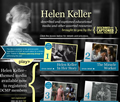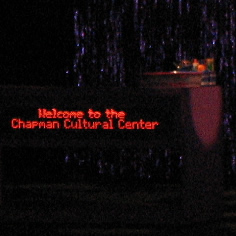 |
 |
|
This month’s features: |
|
Helen Keller & DB Awareness |
Resources for Parents |
The DCMP at the Theater |
||

New DCMP site offers media that focuses on Helen’s historic life and work. |

Helpful parenting/family resources in celebration of Family Wellness Month. |

The DCMP goes on a field trip for a captioned presentation of Nobody’s Perfect. |
Helen Keller & DB Awareness |
||||||||||
Helen Keller’s fame and appeal are nearly universal—an historical figure whose experience and life’s work transcend her disability and place her among the twentieth century’s most notable personalities. The DCMP has created a new webpage at dcmp.org/helenkeller to help teachers, families, and students locate resources that chronicle the life and work of this truly amazing woman. From her 1955 Academy Award-winning biography, Helen Keller In Her Story, to the Emmy Award-winning classic, The Miracle Worker, our collection truly has something for everyone! Speaking of In Her Story, its distributor, Phoenix Learning Group, has granted permission for the DCMP to make it available to the general public (watch with captions or with description—no DCMP account needed, though we continue to urge all qualifying individuals to sign up for an account) for a period of two weeks (May 12 until May 26). This is a great opportunity to sample one of the thousands of quality educational titles in our collection. Even though the end of the school year is approaching for many students across the country, don’t forget that the week of Helen Keller’s birthday (June 27 to July 3) has been designated as Deaf-Blind Awareness Week since 1984. Teachers—remind your students and their families that summer vacation is still a great time to learn, and that advocacy and awareness about deaf-blindness is important because, as the Helen Keller National Center proclaims, deaf-blindness doesn’t end with Helen Keller. Related Links
Share This Story
|
Related DCMP Titles |
|||||||||
Resources for Parents |
||||||||||
May is Family Wellness Month across the U.S.A. While the health and well-being of your family and its members is an important topic year-round, the spring season is a great time to interject some additional healthfulness into your family routine. The DCMP’s collection is brimming with accessible media that focuses on healthy activities, emotional and physical health, and a host of other family health and wellness topics. A good dose of support and input for family health and other issues is available from parent and family groups. The DCMP works closely with several great organizations, and below is some introductory information about each of them. Don’t miss this opportunity to learn more about them. American Society for Deaf Children (ASDC)ASDC was founded in 1967 as a parent-helping-parent organization. Today, ASDC is a national, independent non-profit organization whose purpose is providing support, encouragement, and information to families raising children who are deaf or hard of hearing. Please visit our website at deafchildren.org or contact Cheri Dowling at 1-800-942-2732. Hands & Voices (H & V)H & V is a nationwide non-profit organization dedicated to supporting families and their children who are deaf or hard of hearing, as well as the professionals who serve them. We are a parent-driven, parent/professional collaborative group that is unbiased towards communication modes and methods. Please visit our website at handsandvoices.org. National Association for Parents of Children with Visual Impairments (NAPVI)NAPVI is a national, non-profit, independent organization that enables parents to find information and resources for their children who are blind or visually impaired, including those with additional disabilities. Please visit our website at napvi.org and be sure to check out our social network (in partnership with the American Foundation for the Blind), FamilyConnect. National Family Association for Deaf-Blind (NFADB)NFADB is a non-profit, volunteer-based family association. Our philosophy is that individuals who are deaf-blind are valued members of society and are entitled to the same opportunities and choices as other members of the community. We are the largest national network of families focusing on issues surrounding deaf blindness. Related Links
Share This Story
|
Related DCMP TitlesThe following titles are only a few of those available from the DCMP that focus on parenting and family health/wellness.
|
|||||||||
The DCMP at the Theater |
|||||||||||
Nobody’s Perfect is a new musical by Academy Award winner Marlee Matlin and Doug Cooney. Based on their book by the same title, the play’s goal is to help kids understand each other better. Performed simultaneously in spoken English and American Sign Language—and featuring captions displayed on multiple screens around the theater—this production recently came to the Chapman Cultural Center in the DCMP’s hometown of Spartanburg, SC.
The play touches upon various aspects of Deaf culture [PDF], what it’s like growing up deaf, and the communication barriers that can exist between kids who are deaf and their hearing peers. The DCMP staff were treated to the tremendous talent and performance of those from the Kennedy Center Theater for Young Audiences on Tour, which, for 15 years, has been a leader in bringing imaginative and original works around the nation. More than 30 tours have played hundreds of cities in 49 states and Canada for an audience of over 2 million children, teachers, and parents. Their appearance in Spartanburg brought the professionalism and talent that has become the trademark of the Kennedy Center to those who may not have had the chance to visit the nation’s performing arts center in Washington, D.C. Related Links
Share This Story
|
Related DCMP TitlesThe following titles are only a few of those available from the DCMP that focus on Deaf culture, ASL, and acceptance of others’ differences. |
||||||||||
Quick Hits |
||||
Recommendations for Summer Watching (and Reading) |
National Consortium on Deaf-Blindness Issues Annual Child Count |
Accessible Movies (at Home and at the Theater) |
||

The end of the school year is approaching for many students, but they don’t have to wait for next year to enjoy a few good DCMP titles based upon popular children’s books. DCMP flyers such as “Accessible Children’s Literature Videos,” “Children’s Classics From the DCMP,” and “Watch any good books lately?” [PDF] are great starting points on your search for summer fun and adventure (and learning, of course). Graduate-Level Course Focused on CA/N PreventionAttention teachers, graduate students, and counselors. Dr. Harold Johnson (who recently authored an article about child abuse/neglect [CA/N]), is offering a remote graduate-level course at Michigan State University [PDF] focused on awareness and prevention of CA/N as it applies to children with disabilities. Interested individuals seeking graduate credits or CEUs are encouraged to inquire about this course. |

The National Consortium on Deaf-Blindness has released its 2009 child count data, which includes complex data tables and interactive maps, to provide comprehensive data about children with deaf-blindness living in the U.S. and its territories. According to the National Consortium’s website, the annual child count is conducted “to gather all possible data on each and every person who is deaf-blind to ensure that these people are getting the highest quality services that the professions have developed.” |

Everyone enjoys a good movie once in awhile, and now it’s easier than ever to find accessible movies, thanks to WGBH’s Media Access Group. Not only have they partnered with major film studios Sony Pictures and Universal Studios to ensure that theatrical DVS makes it onto home releases, they’ve compiled a list of DVD/Blu-ray releases available with description at the easy-to-remember URL describedmovies.org. Of course, a lot of families like to take in a movie at their local theater: check out our clearinghouse articles about captioned movies [PDF] and described movies [PDF] at local theaters for suggestions and background information about the technologies involved, as well as how to find theaters that offer accessible showings. Thanks to a recent landmark ruling by the 9th Circuit Court of Appeals in Harkins v. Arizona, there should soon be even more theaters offering equal access. |
||
|
The contents of this newsletter were developed under a grant from the U.S. Department of Education, Cooperative Agreement #H327N060002. However, those contents do not necessarily represent the policy of the U.S. Department of Education, and you should not assume endorsement by the Federal Government. Project Officer, Ernest Hairston. The DCMP is administered by the National Association of the Deaf. |
||||||||
   
 
|
|||||||||












